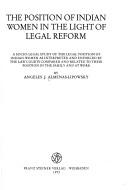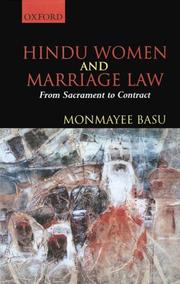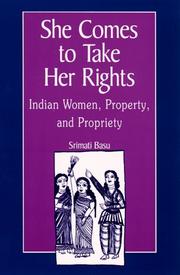| Listing 1 - 3 of 3 |
Sort by
|

ISBN: 3515020500 Year: 1975 Publisher: Wiesbaden : Steiner,
Abstract | Keywords | Export | Availability | Bookmark
 Loading...
Loading...Choose an application
- Reference Manager
- EndNote
- RefWorks (Direct export to RefWorks)
Domestic relations (Hindu law). --- Domestic relations --- Women (Hindu law). --- Women --- Legal status, laws, etc

ISBN: 0195645383 Year: 2001 Publisher: New Delhi Oxford University Press
Abstract | Keywords | Export | Availability | Bookmark
 Loading...
Loading...Choose an application
- Reference Manager
- EndNote
- RefWorks (Direct export to RefWorks)
In-depth study of the problems faced by Hindu women in marriage from 1856 to 1956. Remedial legislative measures to solve these problems and their likely effects on the status of women in Hindu society are also discussed at length. (OUP)
Hindu women --- Marriage (Hindu law) --- Marriage law --- Women (Hindu law) --- Legal status, laws, etc

ISBN: 0585075727 9780585075723 0791440958 0791440966 0791495922 Year: 1999
Abstract | Keywords | Export | Availability | Bookmark
 Loading...
Loading...Choose an application
- Reference Manager
- EndNote
- RefWorks (Direct export to RefWorks)
Using the contemporary workings of property law in India through the lives and thoughts of middle-class and poor women, this is a study of the ways in which cultural practices, and particularly notions of gender ideology, guide the workings of law. It urges a close reading of decisions by women that appear to be contrary to material interests and that reinforce patriarchal ideologies.Hailed as a radical moment for gender equality, the Hindu Succession Act was passed in India in 1956 theoretically giving Hindu women the right to equal inheritance of their parents' self-acquired property. However, in the years since the act's existence, its provisions have scarcely been utilized. Using interview data drawn from middle-class and poor neighborhoods in Delhi, this book explores the complexity of women's decisions with regard to family property in this context. The book shows that it is not passivity, ignorance of the law, naivet about wealth, or unthinking adherence to gender prescriptions that guides women's decisions, but rather an intricate negotiation of kinship and an optimization of socioeconomic and emotional needs. An examination of recent legal cases also reveals that the formal legal realm can be hospitable to women's rights-based claims, but judgments are still coded in terms of customary provisions despite legal criteria to the contrary.
Property (Hindu law). --- Sex role --- Women (Hindu law). --- Women --- Women's rights --- Economic conditions. --- Social conditions. --- Women (Hindu law) --- Property (Hindu law) --- Hindu law --- Legal status, laws, etc. (Hindu law) --- Women's Rights --- Law --- Political Science --- Social Science --- Religion --- Social science
| Listing 1 - 3 of 3 |
Sort by
|

 Search
Search Feedback
Feedback About UniCat
About UniCat  Help
Help News
News